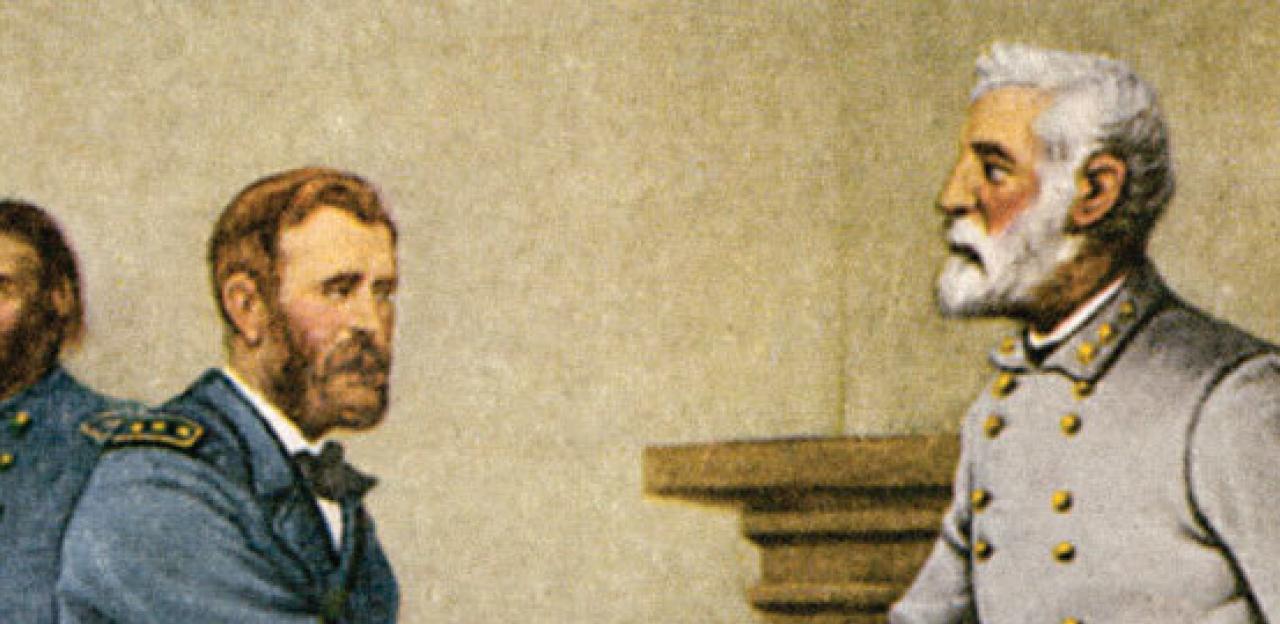

Goal: Using and referring to various sources, students will develop an argument as to whether or not Robert E. Lee’s surrender of his army at Appomattox in April 1865 effectively ends the conflict known as the American Civil War.
CCSS.ELA-LITERACY.RH.9-10.1
Cite specific textual evidence to support analysis of primary and secondary sources, attending to such features as the date and origin of the information.
CCSS.ELA-LITERACY.RH.9-10.9
Compare and contrast treatments of the same topic in several primary and secondary sources.
CCSS.ELA-LITERACY.RH.9-10.6
Compare the point of view of two or more authors for how they treat the same or similar topics, including which details they include and emphasize in their respective accounts.
CCSS.ELA-LITERACY.RH.11-12.3
Evaluate various explanations for actions or events and determine which explanation best accords with textual evidence, acknowledging where the text leaves matters uncertain.
CCSS.ELA-LITERACY.RH.11-12.7
Integrate and evaluate multiple sources of information presented in diverse formats and media (e.g., visually, quantitatively, as well as in words) in order to address a question or solve a problem.
CCSS.ELA-LITERACY.RH.11-12.9
Integrate information from diverse sources, both primary and secondary, into a coherent understanding of an idea or event, noting discrepancies among sources.
CCSS.ELA-LITERACY.WHST.9-10.1 & CCSS.ELA-LITERACY.WHST.11-12.1
Write arguments focused on discipline-specific content.
CCSS.ELA-LITERACY.WHST.9-10.7 & CCSS.ELA-LITERACY.WHST.11-12.7
Conduct short as well as more sustained research projects to answer a question (including a self-generated question) or solve a problem; narrow or broaden the inquiry when appropriate; synthesize multiple sources on the subject, demonstrating understanding of the subject under investigation.
NCSS Standards for Social Studies:
1—Culture
2—Time, Continuity, and Change
3—People, Places, and Environment
5—Individuals, Groups, and Institutions
6—Power, Authority, and Governance
10—Civic Ideals and Practices
This is an inquiry lesson where students will do research to answer the inquiry question concerning the end of the Civil War and the Confederate surrender. Students will develop a hypothesis, search for evidence in multiple primary and secondary sources, and complete a graphic organizer. Through this process students will develop a strong answer to the inquiry question posed at the beginning.
Does Robert E. Lee’s surrender of the Army of Northern Virginia at Appomattox effectively end the conflict known as the American Civil War?
There are ways to scaffold this lesson based on your students’ ability and familiarity with research and discussion. Here are three options; use any combination that works best for your class.
As a class read the discussion guide up to Question 1. Discuss how asking more questions can lead to an answer to the inquiry question. Go through the discussion guide completely.
Read the primary and secondary sources together. Make notes and highlight while reading the documents - identify answers to certain questions AND identify text that might help answer the inquiry question. As you go through the various sources fill in the Storyboard.
At the end, as a class answer the inquiry question. You can show how to answer the question multiple ways, identifying evidence for each answer.
Students can complete the Storyboard and Discussion Guide independently and/or with some help from the teacher or peers.
As a class use the Socratic method as you work through the questions, begin with What Happened? With your students using their Storyboard to walk through the timeline of events.
Complete your discussion with the main Inquiry Question. Help students identify evidence to support their answers.
Discuss as a group, using the Socratic method. Begin by having students discuss What Happened, using their Storyboard. The teacher can use the questions on the Discussion Guide, but ask more questions and have students present more questions as the conversation moves along.
Complete the discussion with the Inquiry Question. Students should have differing answers and evidence to defend their answers
Students will answer the inquiry question either orally or in essay form. They should use evidence from primary and secondary sources. Some documents have been provided, but students can do additional research to bolster their argument.
Assessment in this Lesson: